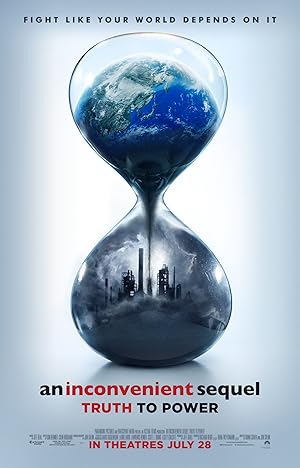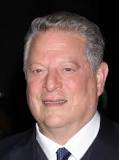
An Inconvenient Sequel: Truth to Power Page #3
And I've always
started my slideshows
with those pictures.
When people can see
the Earth from space,
they naturally find it easier
to feel a connection
to our shared home.
And the last image
from the Apollo program,
The Blue Marble,
the one picture of the entire
Earth fully illuminated,
completely changed the way
people think about the planet.
It energized the modern
environmental movement.
I put that picture
on my office wall
in the West Wing
of the White House,
"Hey, I've been looking
at this same picture here,"
"and I'm just wondering
if there's another one."
I thought, what if we could
Might that help to build
the commitment people have
for saving the climate balance?
And that's when I learned
there's really not another one.
That's what led to the idea
of the DSCOVR satellite.
Not only for these pictures,
but because of
the amazing scientific
data gathering that you can do
from that special point
in space.
There was opposition
in the Congress.
I was about to run
for president,
and that may have had
something to do with it.
But once I finally
got it approved,
other instruments
And one was the crucial
early-warning device
for solar storms
that threaten electric
utility grids and pipelines.
gave it a launch date.
And then after
and the inauguration
of Bush and Cheney,
they canceled
the satellite launch.
Please stand for the invocation.
Reverend Graham.
The new administration,
they didn't really realize
they were also canceling
this solar storm
early-warning system.
And the businesses
that depend on it
started making a lot of noise.
And they proposed
to resolve that quandary
by taking all of
the climate instruments
and the camera
off of the satellite,
replacing them with
the equivalent of sandbags
and only leaving
the one instrument
that these powerful industries
wanted to be put into orbit.
I thought,
"Wow, that is extremism."
By the end of it,
this satellite was
put in storage.
We had a real opportunity
to start building
enough public support
to really get on track
to solving the climate crisis.
But we lost that opportunity.
And now, we cannot afford
to lose it again.
Okay, Bo.
This house was my home
when I was growing up as a boy.
My mother and father built it.
LBJ came to this farm.
He fell out with my dad
when my dad became one of
the leading opponents
of the Vietnam War,
but they served in the Senate
together a long time.
Here's a picture of my dad
doing Meet the Press, and...
Then, many years later,
me doing Meet the Press.
Here's a, uh,
handwritten note that
my second-oldest daughter,
Kristin, wrote back in 1987,
when we had
whether or not
I should run for President.
It's divided into good parts
and bad parts.
"Number 1:
Wants to do it.""Number 2:
Has a good chance.""Number 3:
A lot of people""who know the other candidates
don't like them."
Um...
"He might get elected."
"It would be a good time
to run things."
"He thinks
"The bad points. Number 1:
He would not be here a lot."
"Number 2:
Uh...""It would be hard to
get more publicity"
"than some of the others."
"Number 3:
""Would not like to have Social
Security around all the time."
Meaning the Secret Service,
of course.
Just moments ago,
and congratulated him
on becoming
the 43rd President of
the United States.
Neither he nor I anticipated
this long and difficult road.
Let there be no doubt
while I strongly disagree
with the court's decision,
I accept it.
this outcome,
which will be ratified
next Monday
in the Electoral College.
And tonight, for the sake of
our unity as a people
and the strength of
our democracy,
I offer my concession.
I had a detailed plan
for my life.
But it turned out that life
had a different plan for me.
You know, anybody
who decides to be a part of
helping to solve
the climate crisis has
a constant struggle
between hope and despair.
Uh, and so when you see
these slides about
all the damage
that's being done, hang on,
because hope is coming.
Don't sink too low!
Despair can be paralyzing.
But we're building up speed
and we're seeing
a tremendous amount of
positive change
that gives me the optimism
that I feel about this.
Let me give you some exciting
examples. Look at wind.
One day this month,
Scotland got 100% of
its electricity from wind.
In Portugal,
they had four days straight
last May on
renewable energy alone.
And on a global basis,
wind alone can supply
40 times the entire
global demand for energy.
But let's look at solar.
This, to me, is the most
exciting new development.
Fourteen years ago
the best projections available
were that we would be able
to install worldwide
one gigawatt of
solar electricity per year.
Well, when 2010 arrived,
we beat that goal by
17 times over.
Last year, we beat that goal
58 times over.
This year, we're on track to
beat that goal 73 times over.
This is an exponential curve,
and it is astonishing!
And it continues to go up
at a steeper rate
because the cost of
silicon solar cells
continues to go down.
I wish that every state
would encourage solar.
Including Florida.
You know, Florida's called
the Sunshine State?
The head of the second-biggest
fossil fuel utility there
was actually quoted as saying,
"Yes, we're the Sunshine State,"
"but, remember, we're also
And they have lobbied
the state legislature
to basically make it illegal
your rooftop from anybody
but the
fossil fuel-burning utility!
And they're trying to use
to bend the politicians
to their will.
What the public wants
doesn't seem to matter.
It's pathetic!
In
Campaign 2016 segment tonight,
an interview with Donald Trump.
Not a believer
in global warming.
Obama thinks it's
the number one problem
of the world today,
and I think
it's very low on the list.
If you were President,
would you invest
a lot of money in
alternative energy
to get away from fossil fuels?
Now solar always
sounds better than it is.
You know, you get
your money back in 36 years.
The problem is the panels
destroy themselves
after ten years.
...you know, one of the top,
top professors at MIT.
Hey!
Hey, Mr. Vice President,
thank you so much for coming.
Thank you.
So, we're
in relatively early stages
of the investigation, but
some of these companies
and the denial organizations
and groups like the
American Petroleum Institute
have been actively seeking
to distort the market,
to suppress investment
in renewables
through this relatively
new line of propaganda,
which is,
Translation
Translate and read this script in other languages:
Select another language:
- - Select -
- 简体中文 (Chinese - Simplified)
- 繁體中文 (Chinese - Traditional)
- Español (Spanish)
- Esperanto (Esperanto)
- 日本語 (Japanese)
- Português (Portuguese)
- Deutsch (German)
- العربية (Arabic)
- Français (French)
- Русский (Russian)
- ಕನ್ನಡ (Kannada)
- 한국어 (Korean)
- עברית (Hebrew)
- Gaeilge (Irish)
- Українська (Ukrainian)
- اردو (Urdu)
- Magyar (Hungarian)
- मानक हिन्दी (Hindi)
- Indonesia (Indonesian)
- Italiano (Italian)
- தமிழ் (Tamil)
- Türkçe (Turkish)
- తెలుగు (Telugu)
- ภาษาไทย (Thai)
- Tiếng Việt (Vietnamese)
- Čeština (Czech)
- Polski (Polish)
- Bahasa Indonesia (Indonesian)
- Românește (Romanian)
- Nederlands (Dutch)
- Ελληνικά (Greek)
- Latinum (Latin)
- Svenska (Swedish)
- Dansk (Danish)
- Suomi (Finnish)
- فارسی (Persian)
- ייִדיש (Yiddish)
- հայերեն (Armenian)
- Norsk (Norwegian)
- English (English)
Citation
Use the citation below to add this screenplay to your bibliography:
Style:MLAChicagoAPA
"An Inconvenient Sequel: Truth to Power" Scripts.com. STANDS4 LLC, 2025. Web. 6 Mar. 2025. <https://www.scripts.com/script/an_inconvenient_sequel:_truth_to_power_2786>.







Discuss this script with the community:
Report Comment
We're doing our best to make sure our content is useful, accurate and safe.
If by any chance you spot an inappropriate comment while navigating through our website please use this form to let us know, and we'll take care of it shortly.
Attachment
You need to be logged in to favorite.
Log In